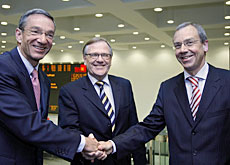Switzerland braces for financial “Big Bang”

The Swiss financial sector is prepared for new European Union rules that come into force on Thursday and promise to revolutionise trading on the continent.
Some banks have described the move as “poison” as it compels them to ask clients details about their finances. Switzerland is not in the EU but any institutions trading there must comply with the changes.
The Swiss Bankers Association says it is too early to assess the impact on Switzerland as many EU countries have yet to introduce the necessary legislation to implement the reforms.
In fact, Switzerland is more prepared than many EU states to meet the challenge.
The EU’s Markets in Financial Instruments Directive (MiFID) has been described as the sector’s “Big Bang”. The new regulations have been designed to improve competition and drive down costs by creating a single financial market.
Trading organisations must inform clients where they can find the best price for transactions. The rules also break the monopoly of stock exchanges by allowing other platforms to conduct trades.
Switzerland’s two biggest banks, UBS and Credit Suisse, are involved in projects to form a new trading platform (Project Turquoise) and an enterprise (Boat) to sell data that traders use to find the best deals.
These projects would bring direct competition to the Swiss stock exchange (SWX), despite both banks being joint owners of the bourse.
Swiss bourse restructures
SWX responded to the heightened competitive environment by slashing blue-chip trading charges last year and announcing further reductions for April 2008.
In addition, a cost-saving restructure will merge SWX, its clearing company SIS Group and data services company Telekurs under the umbrella of the Swiss Financial Market Services at the start of next year.
SWX chairman Peter Gomez told swissinfo he was confident both banks would stay loyal to the Swiss bourse and thought Turquoise would attack London and Frankfurt.
Swiss banks, particularly investment banks, with subsidiaries in the EU are also subject to the rule changes. Those that conduct significant cross-border business and EU-based firms with Swiss branches are not compelled to comply, but many will do so for business reasons.
However, MiFID’s cast-iron regulations have not gone down too well with some parties who believe self-regulation is the best method of supervision.
Confidentiality breaches
Earlier this year the Swiss Private Bankers Association took issue with the MiFID requirement to assess whether clients are suitable to bear risks. It called the changes “poison” for breaching Swiss confidentiality rules.
Nevertheless, most Swiss financial institutions are more advanced than their EU counterparts in complying with MiFID, according to consultancy firm KPMG.
“The Swiss are taking the new regulations on board more readily than in many EU states. In fact, many see it as an opportunity to coordinate the activities of their Swiss and foreign-based branches and work more efficiently,” KPMG lawyer and MiFID expert Marc Raggenbass told swissinfo.
“Switzerland’s existing regulations are already about 80 per cent MiFID compliant so there will not be such a culture shock here as in France, for example.”
swissinfo, Matthew Allen in Zurich
The Swiss stock exchange (SWX) operates its pan-European blue-chip platform virt-x in London and the world’s largest derivatives exchange, Eurex, in cooperation with the German bourse in Frankfurt.
The proposed trading platform Project Turquoise, backed by UBS and Credit Suisse, appointed its chief executive and a company to provide technology in late October. It is expected to be up and running in the summer of next year.
Competition between the world’s exchanges has also intensified with a series of mergers and proposed mergers in recent years.
MiFID is contained in the EU’s Financial Services Action Plan (launched in 1999) that lists 41 measures to integrate the European financial market and regulatory system.
It demands that traders comply with “best execution” by telling clients where they can find the best price, fastest transaction time and most efficient means of conducting their trades.
It also breaks the monopoly of stock exchanges that had previously been the only institutions that could conduct share transactions.
Investment banks and other traders have complained for some time that exchange fees were too high while transaction times were too slow.
MiFID comes into force on November 1, but several EU states – chiefly the Czech Republic, Estonia, Finland, Greece, Hungary, Malta, the Netherlands, Poland, Spain and Slovenia – are nowhere near being ready. However they have been granted special dispensation to continue trading.

In compliance with the JTI standards
More: SWI swissinfo.ch certified by the Journalism Trust Initiative











You can find an overview of ongoing debates with our journalists here . Please join us!
If you want to start a conversation about a topic raised in this article or want to report factual errors, email us at english@swissinfo.ch.